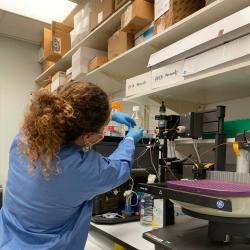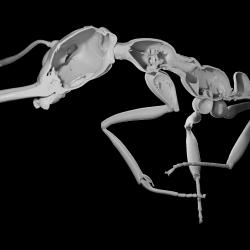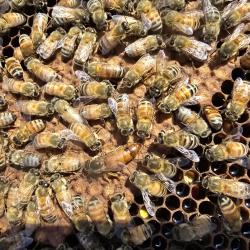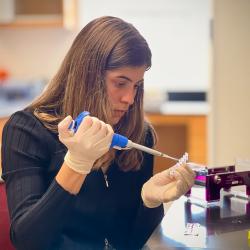Rooting for Healthy Forests
UMD biological sciences Ph.D. student Damani Eubanks is protecting forests and mentoring the next generation of environmental stewards.

Damani Eubanks grew up in Maryland’s Prince George’s County but learned at a young age that there was a wider—and wilder—world beyond city limits. His hiking and camping trips with local youth programs set him on course to a forestry career, and now he’s leading the next generation into the great outdoors.
As a volunteer with the D.C.-based City Kids Wilderness Project, Eubanks introduces middle and high school students to outdoor activities that build resilience and cultivate courage, whether it’s rock climbing, hiking, kayaking or snowboarding. Since January 2025, he has also been working as a full-time ecologist with the U.S. Forest Service while wrapping up his Ph.D. in biological sciences at the University of Maryland.
With a specialization in behavior, ecology, evolution and systematics (BEES), Eubanks plans to defend his dissertation—focused on a method he developed to predict changes in forest health—this fall. Eubanks said that UMD helped him identify ways that his research can not only benefit forests, but also the people who depend on them.
“I've always known that I wanted to do work that could be felt on the ground and could benefit people while protecting the environment,” he said. “Forests are important because they affect our food and water, acting as natural filtration systems for local waterways. We need forests for the things that we use in our everyday lives.”
A family tradition
Thanks to his formative outdoor experiences, Eubanks knew from a young age that he wanted to pursue environmental science. In 2018, he earned a bachelor’s degree in biological sciences with a focus on ecology and evolutionary biology from the University of Rochester and then started exploring graduate programs.
As the son of two alums from UMD’s College of Education, Eubanks’ path seemed crystal clear.
“UMD was always the home university for us,” Eubanks said, “so after I finished my undergrad at Rochester, I knew that I wanted to come back home.”
Beyond keeping a family tradition alive, Eubanks said he was drawn to UMD for its range of biological science research opportunities. After enrolling in 2018, he began studying tropical forests and the effects of changes in climate and deforestation. He later did field work in Costa Rica and thought his research path was set—then the 2020 pandemic struck.
“Once COVID hit, everything slowed down or was completely frozen,” Eubanks said. “I had to shift gears a little bit and focus more domestically, and that's when I started working with the U.S. Forest Service’s database.”
Now, Eubanks works on research aimed at tracking disturbances and identifying methods of increasing forest resilience with Professor Maile Neel, who holds appointments in the Department of Entomology and the Department of Plant Science and Landscape Architecture.
For his dissertation, he uses Forest Service data to forecast changes in the mid-Atlantic region—including how biodiversity, air quality, soil quality and a forest’s ability to capture carbon dioxide might be affected by climate, land use and other environmental stressors. Eubanks believes these predictions could help landowners, land managers and policymakers get ahead of problems before they occur.
“Predictions for these changes help us plan responses to them,” Eubanks said. “Particularly in areas where we're seeing drastic losses in biodiversity or large changes in carbon output, we would want to mark those as areas of concern.”
If current trends continue, Eubanks’ model predicts a mix of positive and negative outcomes: The air quality in forests could keep improving, but losses in tree diversity are also anticipated, which could have ripple effects for wildlife.
“We're starting to see not so much monocultures, but forests trending toward particular species that are able to adapt to changing climate conditions,” Eubanks explained. “When it comes to wildlife, you get symbiotic relationships and co-evolution that you start to lose as the rarer tree species start to fall off and as native species get replaced by an invasive or non-native species.”
In 2023, a yearlong internship with the Forest Service helped Eubanks prepare for federal research. It also taught him practical skills, including how to explain and justify his research to federal policymakers.
“The internship program helped prepare me for some of the changes between a more academic setting and a federal research setting,” he said. “As a civil servant, the work we do should benefit the public and people’s everyday lives.”
Fighting fire with fire
Since joining the Forest Service as a full-time employee, Eubanks has been overseeing the Central Hardwood Forest—a region that encompasses a dozen states in the Midwest, East and South. While he can’t divulge specific project details, he works closely with land managers and owners to facilitate Forest Service initiatives.
One of Eubanks’ broader goals is to build community support for “prescribed fire,” a strategy developed by Indigenous peoples that uses smaller, controlled fires as a force for good. When carefully managed, fires can promote forest growth, recycle nutrients and prevent the onset of more extreme and unpredictable wildfires.

“A big push across the field of forestry and forest ecology is getting people to have an understanding of controlled fire and to see that it is beneficial,” Eubanks said. “We have a natural fear instilled in us that fire is bad, but Indigenous peoples have been using fire to control different parts of forests for centuries and it’s been effective.”
Beyond his forestry work, Eubanks was also a member of UMD’s Global STEWARDS program. As part of that program, he traveled to Tanzania in January 2025 to learn about sustainable farming practices that affect local food, energy and water supplies.
“Global STEWARDS helped me explain how forestry affects people’s everyday lives,” he said. “That trip was a great way for me to frame my research on an even more personal level—to meet a farmer in Tanzania and to be able to say why sustainability, environmental conservation and forestry are important. You get to meet people where they're at.”
Even when Eubanks isn’t working or conducting research, he’s finding ways to help people in his community. A longtime tennis player, he serves as a volunteer tennis coach with the Washington Tennis and Education Foundation, which provides training and after-school academic support to underserved students.
For Eubanks, participating in tennis and wilderness programs at an early age was a life-changing experience, and he’s happy to keep paying it forward.
“Programs like the City Kids Wilderness Project helped foster my interest in conservation and in research,” Eubanks said. “Passing on that same experience to the next generation and instilling a love of nature into kids—particularly ones who might not otherwise get the opportunity—feels like part of my duty.”







